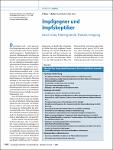Impfgegner und Impfskeptiker
Geschichte, Hintergründe, Thesen, Umgang
Meyer, Christiane
Reiter, Sabine
Impfkritiker, d. h. Impfgegner und Impfskeptiker, gibt es seit Einführung der Pockenschutzimpfung. Obwohl in Deutschland die Zahl der Impfgegner mit geschätzten 3–5% gering ist, können sie—wie in der Vergangenheit das Beispiel der Pockenschutzimpfung und aktuell die Diskussion zum Kombinationsimpfstoff MMR in England zeigen—doch einen großen Einfluss auf die Impfakzeptanz der Bevölkerung ausüben. Möglichkeiten der modernen Informationsgesellschaft erleichtern die Vernetzung und Verbreitung impfkritischer Ideen. Der Rückgang der impfpräventablen Erkrankungen lässt deren Wahrnehmung in der Öffentlichkeit und Gesundheitspolitik sinken. Auch deshalb werden die sehr seltenen Komplikationen des Impfens im Vergleich zu den bestehenden Erkrankungskomplikationen überbewertet. Vorschläge zum Umgang mit Impfkritikern sollten neben strukturellen Veränderungen in der Impfprävention auch Elemente der Risikokommunikation berücksichtigen. Scepticism and critical attitudes towards immunisation have prevailed since the introduction of the smallpox vaccine. In Germany the anti-vaccine movement is rather small (3–5% of the population). Nevertheless its influence on the acceptance of immunisation by the population may be substantial, as shown by the examples of smallpox vaccination and the recent discussion of the combined MMR vaccine in the UK. Modern societies facilitate networking and the dissemination of anti-vaccination ideas. The decline in the incidence of vaccine-preventable diseases has led to a reduced awareness of possible complications from infectious diseases and to an overestimation of the incidence of rarely occurring adverse events following immunisation. Proposals for managing the anti-vaccine movement must take into account changes in immunisation policies and draw on elements of risk communication.
Dateien zu dieser Publikation
Keine Lizenzangabe

